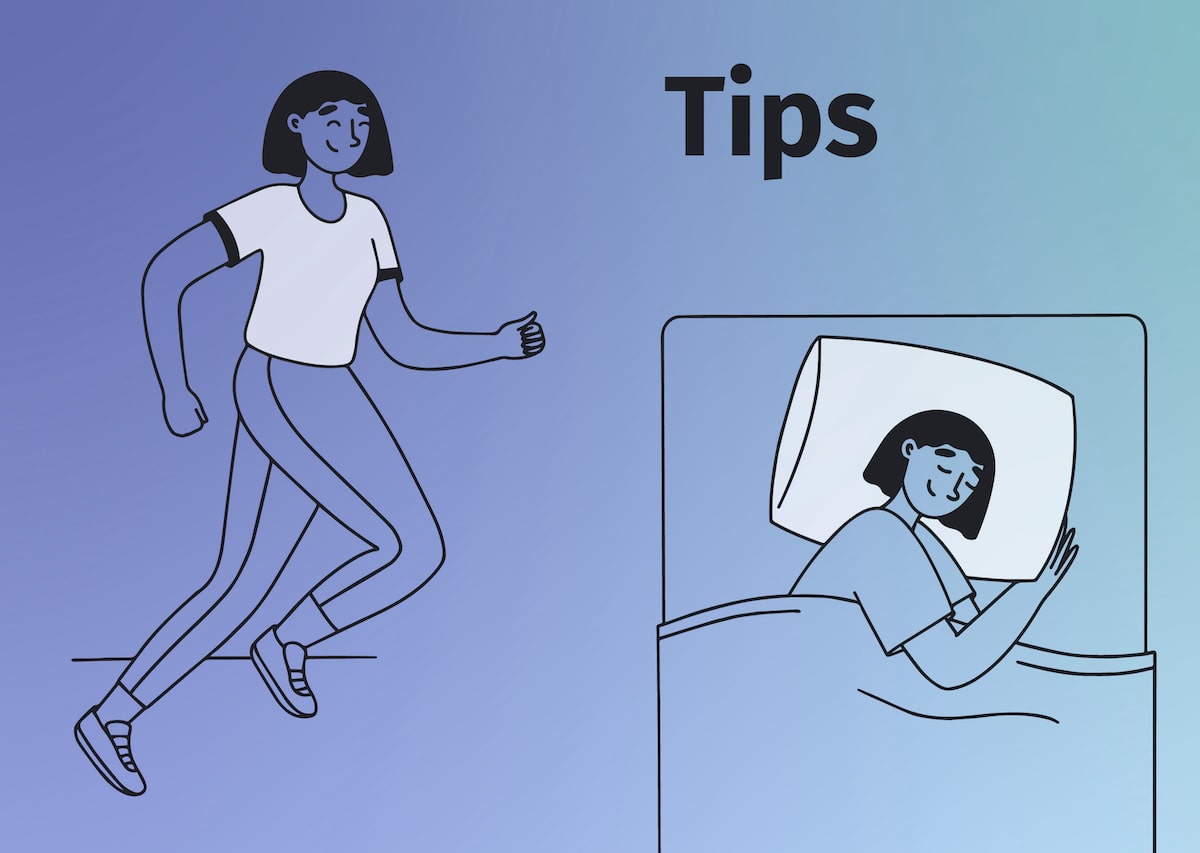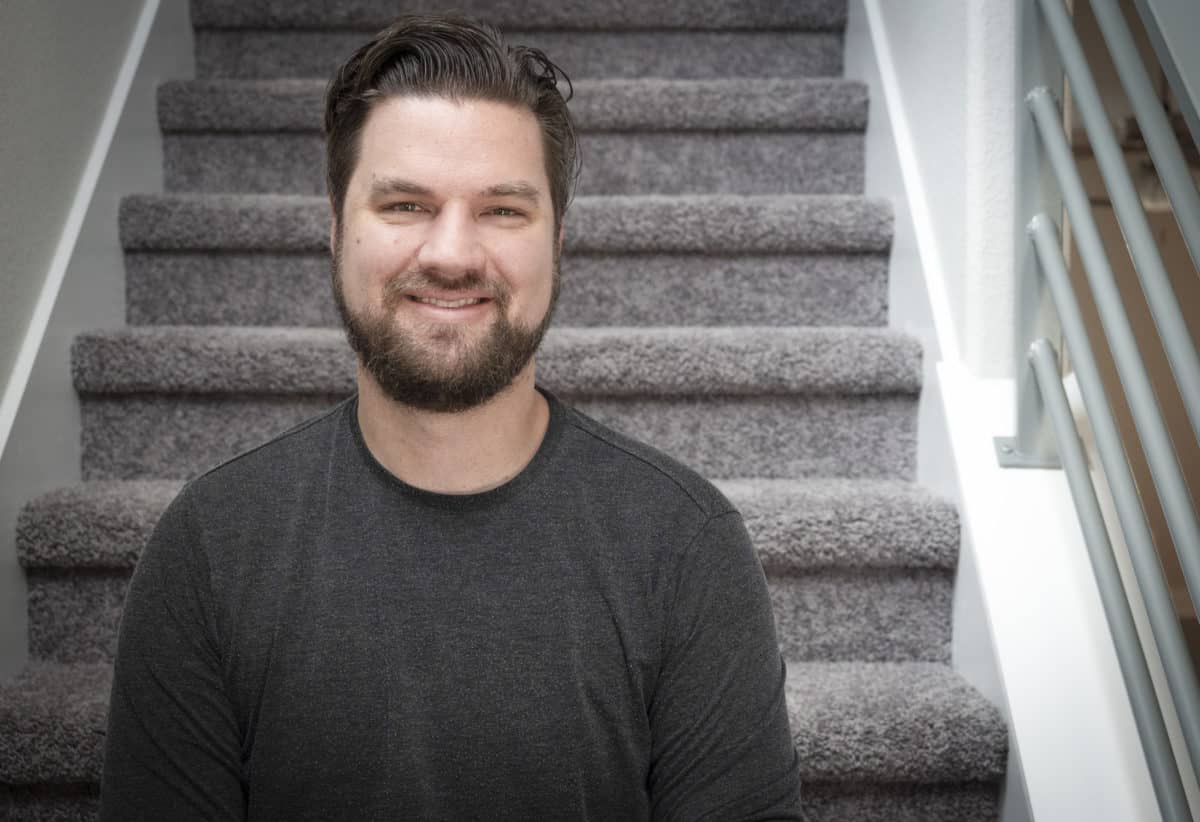You’ve probably heard that sleep is important for your mental health, and might have even noticed that you feel cranky and forgetful following a poor night’s rest. Many of us know that sleep is important for memory, mood regulation, and maintaining overall physical health. Yet, the Centers for Disease Control (CDC) notes that 1 in 3 Americans get less than the recommended amount of sleep (7 to 9 hours per night).
The facts and statistics below highlight the importance of sleep and mental health for a healthy lifestyle, as well as shine light on the issues of sleep deprivation and mental health.
If you or someone you know is struggling with mental health, skip to some resources that may be helpful.
Jump To
ADHD and Sleep Statistics | Depression and Sleep Statistics | Anxiety and Sleep Statistics| PTSD and Sleep Statistics | Schizophrenia and Sleep Statistics | Bipolar Disorder and Sleep Statistics
The Relationship Between Sleep and Mental Health
Consistently getting poor sleep can result in health complications, including negative impacts on mental health. Sleep deprivation can cause mood swings, irritability, forgetfulness, and increased stress. These consequences can impact overall wellness, and exacerbate existing mental illnesses. Furthermore, there are various mental illnesses that can cause people to have worsened sleep patterns.
Why is Sleep Important for Mental Health?
Those who don’t get enough sleep will likely notice the effects on their mental health the next day. Getting just one night of poor sleep can make you feel out of control of your emotions and mood, impair your judgment, and impact your ability to concentrate and memorize important information. Symptoms of conditions like anxiety and depression can worsen with a lack of sleep, and chronic sleep deprivation can lead to more severe issues with mental and physical health.
- The recommended amount of sleep for adults is 7 to 9 hours per night. 1
- 70 million Americans suffer from chronic sleep problems. 2
- In a Mattress Clarity survey from 2025, almost 70% of respondents reported symptoms of fatigue or drowsiness in the previous 7 days because of sleep debt.
- Sleep issues affect a greater number of people with psychiatric conditions. 10-18% of the general US population experience chronic sleep issues, while about 50-80% of patients in a psychiatric practice have sleep problems.3
- A chronic lack of sleep can contribute to mental health problems. A 2021 study found that participants were 2.5 times more likely to have mental distress when getting less than 6 hours of sleep on average compared to those who slept longer. 4
- Acute sleep deprivation can increase levels of stress, as lack of sleep increases cortisol levels (the stress hormone). 5
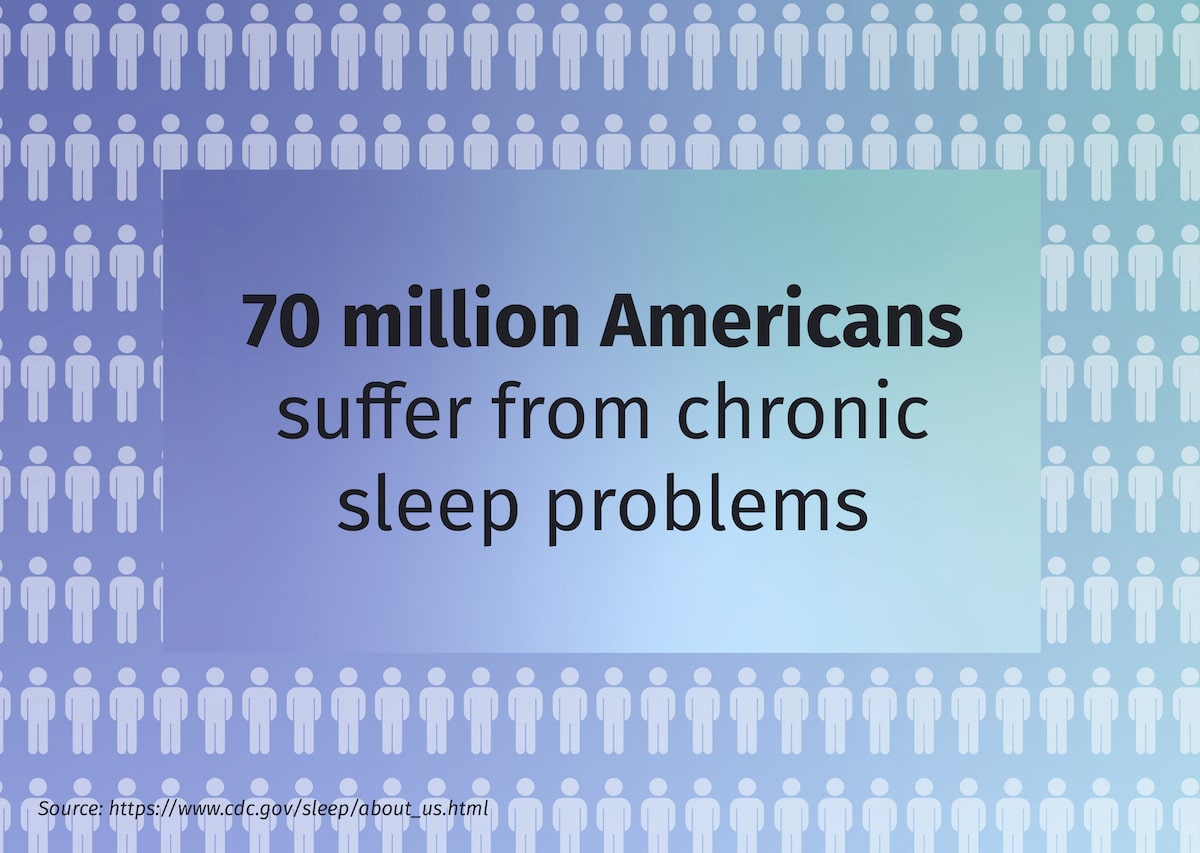
How Does Mental Health Affect Sleep?
Sleep disturbances and overall poor sleep quality are common symptoms of mental health disorders. Anxiety and the chronic fatigue that many depression patients experience increases cortisol levels (the stress hormone), which can disrupt sleep-wake cycles, resulting in poorer quality sleep.
Many people also struggle with stress, which can have a negative impact on sleep. As we’ve discussed, a lack of sleep can result in heightened stress. The statistics below show that stress and worrying at night are common reasons why people struggle with falling and staying asleep.
- About 50% of insomnia cases are associated with depression, anxiety, or psychological stress. 6
- Sleep disturbance is a common symptom of mental distress. During the coronavirus pandemic, the amount of people who experienced sleep problems increased, likely because of psychological distress and other factors, like a change in routine, working from home, and lower activity levels. 7
- 43% of adults in a 2013 survey said that stress kept them awake in the prior month. 8
- 21% of adults reported that they felt more stressed after a night of poor sleep in the 2013 Stress in America survey. 9
- 48.5% of people with insomnia also had a mental health disorder in a study from the Journal of Psychosomatic Research. 10
- Nightmares are more common in those with mental illnesses, and the distress of nightmares is associated with worsening symptoms of mental illness during the day. 11
How Many People are Affected by Mental Illness?
Mental illnesses can affect people of all demographics, though statistics show that some groups may be at increased risk. The number of people diagnosed with a mental illness has also grown in recent years.
- Nearly 1 in 5 adults in America are affected by mental illness. 12
- There has been a 13% increase in diagnosed mental health conditions and substance use disorders between 2010 and 2017. 13
- Suicide is the 12th leading cause of death in the United States. 14
- 30.6% of young adults and 14.5% adults over the age of 50 have a mental illness (2020). 15
- More than 50% of adults with mental illness in the U.S. do not receive treatment. 16
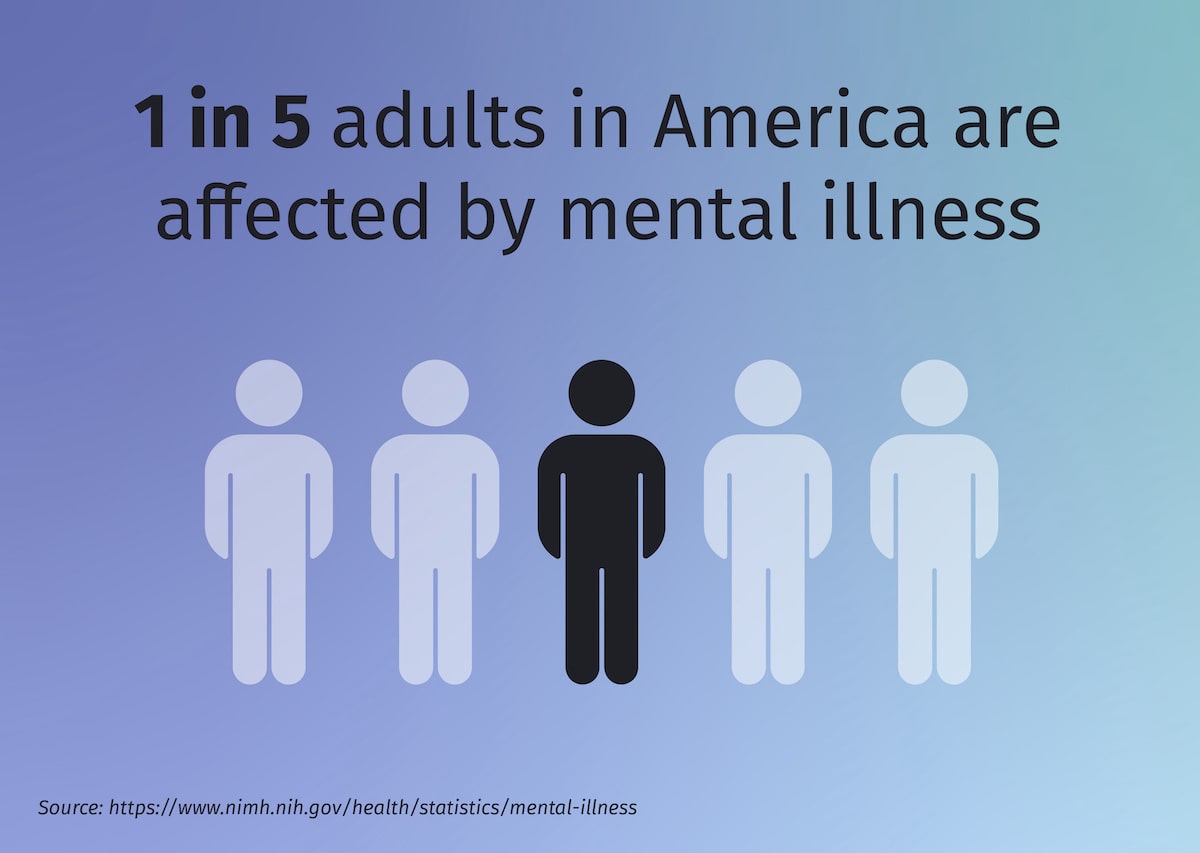
Statistics About Mental Health and Sleep
ADHD and Sleep Statistics
The Mayo Clinic says that some common symptoms of ADHD include impulsivity, difficulty focusing, restlessness, and problems with time management. Many people experience these symptoms from time to time, which can make ADHD difficult to diagnose. Sleep disorders, anxiety, and learning disabilities can present similar symptoms as well.
- About 14% of children ages 3-17 have been diagnosed with ADHD. 17
- 6 out of 10 of children who have been diagnosed with ADHD also have at least one other mental, emotional, or behavioral disorder. 18
- 75% of those with ADHD also have sleep problems. 19
- ADHD is associated with sleep disorders, and the rates of sleep disorders (including, but not limited to, nightmares) in this population is greater than the general population. Nightmare disorders affected 23% of those with ADHD, compared to 16% of those without ADHD in one study. 20
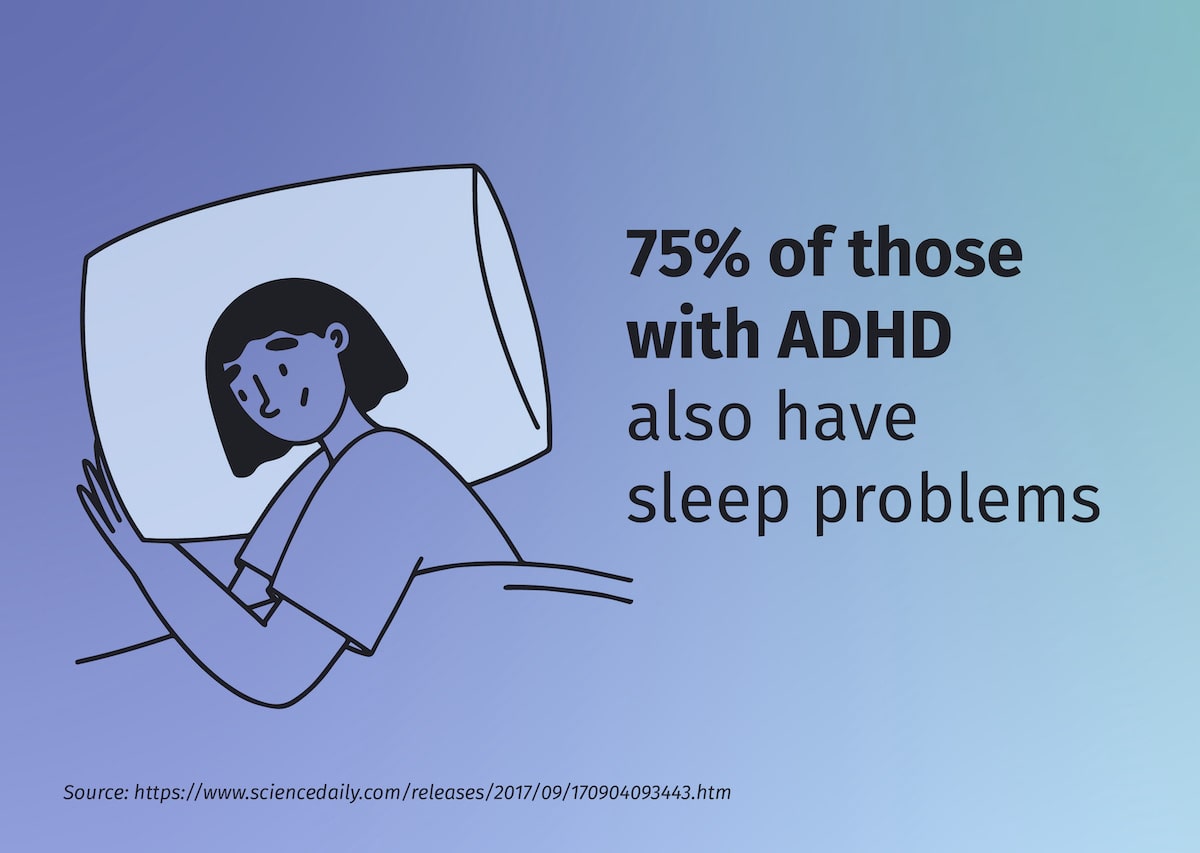
Depression and Sleep Statistics
Those with depression may experience symptoms that range from mild to severe. Some common symptoms include feeling sad, losing interest in activities, feeling tired, and having a lack of energy. Depression can cause issues with sleep, eating, memory, and can result in self-harm.
A few types of depressive disorders include Major depressive disorder (MDD), Persistent depressive disorder (PDD), Postpartum depressive disorder (PPD), Seasonal affective disorder (SAD), and Premenstrual dysphoric disorder (PMDD)
- In 2020, 8.4% of US adults had at least one major depressive disorder. 21
- Women are about 2 times more likely to develop depression than men. 22
- 3 out of 4 people with depression have symptoms of insomnia. 23
- A study found that women aged 20-30 that had shown trouble sleeping were 4 times more likely to have experienced depression in the previous two weeks than those who did not have sleeping troubles. 24
- People with insomnia are 10 times more likely to develop depression than people who sleep well. 25
- The rates of depressive disorder are higher amongst those with obstructive sleep apnea (OSA), the breathing disorder. One 2021 study found that those with OSA were about 2 times more likely to have depressive disorder than those without. 26
- 40% of young adults with depression experience hypersomnia. 27
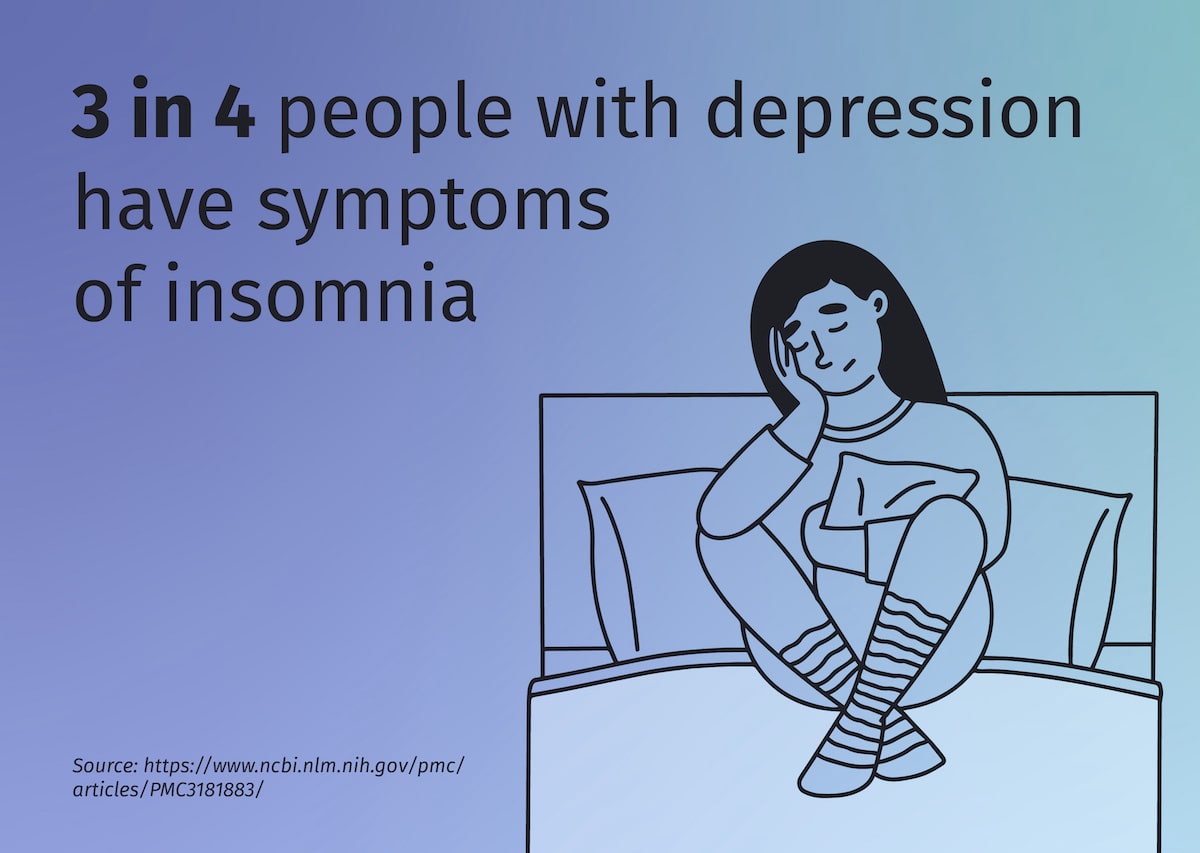
Anxiety and Sleep Statistics
According to the Mayo Clinic, anxiety may make you feel nervous or tense, and you might feel like there is impending danger or doom. It may also be hard for you to stop worrying and focusing on unsettling thoughts.
Some physical symptoms of anxiety include rapid heart rate, sweating, gastrointestinal issues, hyperventilation, feeling tired, and trembling. There are several types of anxiety, including generalized anxiety disorder, panic disorder, specific phobias, and social anxiety. Anxiety and sleep issues are closely linked, as a lack of sleep can contribute to anxiety, and anxiety can result in reduced sleep quality, insomnia, and can contribute to sleep anxiety.
- Anxiety disorders were the most prevalent mental health disorder in 2019, affecting about 300 million people globally. 28
- Those with anxiety were 5 times more likely to experience short sleep duration and had less efficient sleep in a study. 29
- Anxiety can contribute to insomnia, while insomnia can be a cause of anxiety. In a study on the relationship between anxiety and insomnia it was found that insomnia occurred before anxiety in 18% of people, and anxiety before insomnia in almost 44% of people. 30
- About 50% of people with panic disorder have experienced nocturnal panic attacks at least once in their lifetime, or a panic attack that wakes you during sleep. 31
- The specific phobia of falling asleep is called somniphobia, which is often a more intense than sleep anxiety. Those that struggle with it might experience extreme fear of sleep, for reasons such as fear that something bad will happen to them while they sleep (such as sleepwalking, sleep paralysis, or dying in your sleep). 32
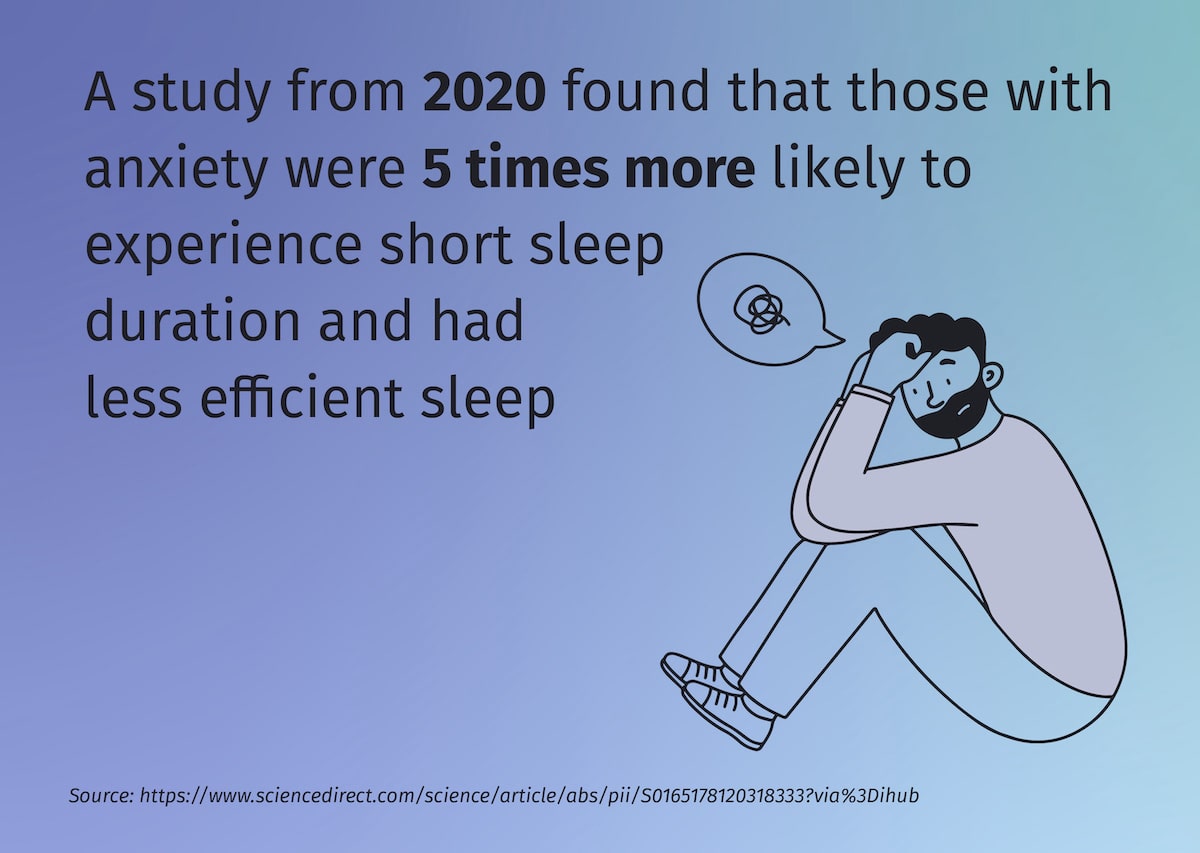
PTSD and Sleep Statistics
Post traumatic stress disorder, or PTSD, is a psychiatric illness that occurs after someone has experienced or witnessed a traumatic event, according to the American Psychiatric Association.
The National Center for PTSD says that it’s normal to experience anxiety, upsetting memories, or have difficulty sleeping after a traumatic event, but those that continue to experience these symptoms may have PTSD. Other symptoms of PTSD include flashbacks of the traumatic event, nightmares, and avoiding places, events, or thoughts related to the trauma.
- 70-91% of those with PTSD also struggle with falling and staying asleep. 33
- Nightmares are a common symptom of PTSD. One study found that ¾ of people with PTSD also experience frequent nightmares. 34
- PTSD is linked to sleep apnea. One study found that it affects 40-90% of those with PTSD. 35
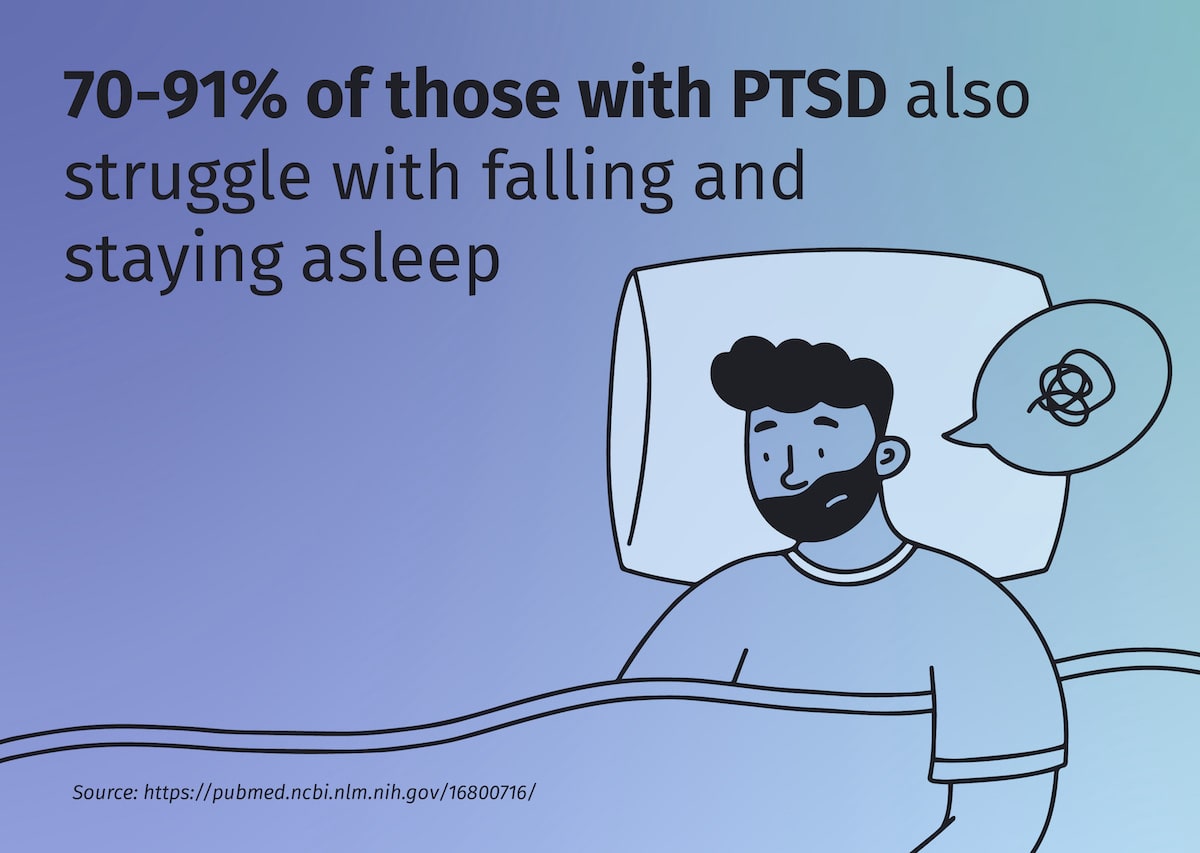
Schizophrenia and Sleep Statistics
According to the National Alliance on Mental Illness (NAMI), schizophrenia is a serious, complex, and long-term mental illness that impacts thinking, emotions, and relationships. Those with schizophrenia are most likely to be diagnosed in their late teens to 30s.
The NAMI also says that schizophrenia can be hard to diagnose, but signs of the disorder include social isolation, seeming to lose touch with reality, and unusual or suspicious thoughts. Symptoms include hallucinations, delusions, lacking interest in life, social withdrawal, cognitive issues, and disturbed sleep.
- Insomnia impacts up to 80% of those with schizophrenia. 36
- Sleep disorders, such as Restless Leg Syndrome (RLS), Obstructive Sleep Apnea (OSA), Periodic Limb Movement Disorder (PLMD), and circadian rhythm dysfunction, often co-occur with schizophrenia. 37
- Those with schizophrenia are more likely to have sleep cycles that are out of sync with a normal circadian rhythm. This affected 50% of schizophrenia patients in one study by the British Journal of Psychiatry. 38
Bipolar Disorder and Sleep Statistics
Bipolar disorder is a mood disorder that causes episodes of mania, or extreme emotional highs, and periods of depression. Someone that is experiencing a manic phase of bipolar disorder may feel full of energy, make risky decisions or overspend, and sleep very little.
When someone with bipolar disorder is going through a period of depression, they may feel sad, tired, irritable, have feelings of hopelessness, and lose interest in activities. Bipolar disorder can have significant impacts on one’s sleep, as these statistics show.
- About 69-99% of bipolar patients having a manic episode have a reduced need for sleep, and those in a depressive state are likely to experience insomnia as well as hypersomnia. 39
- Anywhere from ¼ to ¾ of people with bipolar depression have symptoms of hypersomnia. 40
Tips for Improving Sleep and Mental Health
Therapy
Cognitive Behavioral Therapy for Insomnia (CBT-I) is a type of therapy that can help those struggling with their mental health and sleep. It involves meeting with a licensed mental health provider who is trained to help patients change negative behavioral patterns.
According to the Mayo Clinic, CBT can be helpful for those with mental illnesses such as depression, anxiety, and PTSD, and may help with managing symptoms, overcoming phobias, and learning how to manage emotions.
CBT can also help those that do not have a mental illness. It can help folks manage stress, improve relationships, and can even help improve sleep habits and overall mental health. It’s a good idea to check in with your doctor or psychiatrist if you have concerns about your mental health and/or sleep quality. They might prescribe medication to help those that are struggling with mental illnesses and can help come up with a treatment plan.
Sleep Hygiene
While practicing good sleep hygiene alone won’t help those with chronic insomnia, it can be helpful to implement for those that do not already have good sleep habits. Some sleep hygiene tips include waking up and falling asleep at the same time every day, creating a comfortable sleep environment, and limiting screen time before bed.
Both mental illnesses, like anxiety and depression, and more typical day-to-day stressors, like worrying about work or relationships, can make it difficult to wind down at the end of the day.
It’s important to note that worrying about not being able to sleep can have a negative effect on your sleep quality, so create a sleep hygiene routine that helps you to relax and wind down. A comfortable mattress that keeps your body free of aches and pains can help, too.
Exercise
Exercise can help boost serotonin levels in the brain, which can improve mood, energy, creativity, and can reduce stress. It has been shown to improve sleeping issues as well as a number of mental health issues like anxiety, depression, schizophrenia, and grief. Additionally, daily exercise can help people to fall asleep more quickly and can improve the overall quality of sleep.
Mindfulness and Meditation
Meditation and mindfulness have been shown to help with anxiety and depression, and can also help improve sleep quality. Meditation may help to boost melatonin levels (the hormone that makes you feel sleepy), reduce the number of panic attacks in those with anxiety, and regulate symptoms of depression.
Resources
For those experiencing mental health crises and/or those that are contemplating suicide, the 988 hotline was made available to everyone in the U.S. in July 2025. This new resource is available 24/7 by dialing “988” and connects callers to the 988 Suicide and Crisis Lifeline (formerly known as the National Suicide Prevention Lifeline).
Here are some more helpful resources for those struggling with their mental health:
- Anxiety & Depression Association of America
- National Alliance on Mental Illness (NAMI) HelpLine
- National Center for PTSD
- SAMHSA: Find Treatment
FAQs About Mental Health and Sleep
How does sleep improve mental health?
Sleep is important for our cognitive functioning and the regulation of our emotions. Sleep deprivation has been linked to anxiety, depression, and the worsening of symptoms of various mental health conditions.
Can a lack of sleep lead to mental illness?
Chronic sleep deprivation increases the risk of developing mental health disorders, like anxiety and depression.
What age group is the most sleep deprived?
2019 data from the CDC says that almost 78% of high school students reported short sleep duration, or getting less than 8 hours of sleep per night on average. This is a higher percentage than reported from adults and children.
What percentage of the world is sleep deprived?
62% of adults in a 2019 survey reported that they don’t sleep well.
What mental illness makes it hard to sleep?
Mental illnesses, such as anxiety, depression, and PTSD to name a few, can make it more difficult to fall and stay asleep. Insomnia, or the sleep disorder that makes it hard to sleep, is often caused by stress or mental illness.

